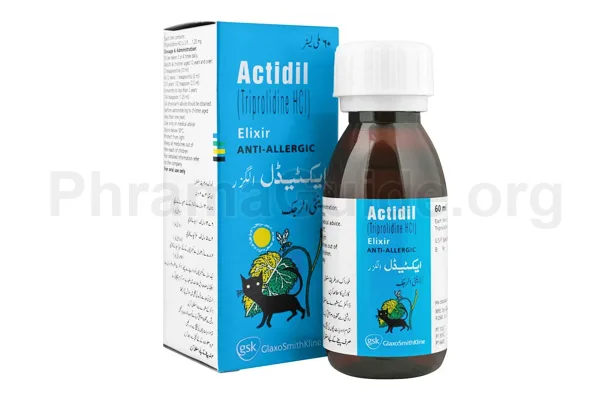Actidil syrup is an antihistamine medication that is primarily used to relieve symptoms associated with allergies and allergic reactions. It is mostly recommended for children and adults where a low dose of medicine is needed. The following are some common uses of Actidil Syrup:
- Allergic Rhinitis: Actidil syrup can be used to relieve symptoms such as sneezing, runny nose, itching, and nasal congestion caused by allergic rhinitis, which is an inflammation of the nasal passages due to an allergic reaction.
- Hay Fever: Actidil syrup can help alleviate symptoms of hay fever, also known as seasonal allergic rhinitis, which occurs during specific times of the year when certain allergens, such as pollen, are prevalent.
- Allergic Conjunctivitis: Actidil syrup may be used to relieve itching, redness, and watering of the eyes associated with allergic conjunctivitis, an inflammation of the conjunctiva caused by an allergic reaction.
- Allergic Skin Conditions: Actidil syrup can help reduce itching and other symptoms associated with allergic skin conditions like hives (urticaria) and eczema.
Off-label Uses of Actidil Syrup
- Other Allergic Reactions: Actidil syrup may also be used to manage symptoms of other allergic reactions, such as insect bites or stings, allergic dermatitis, or food allergies, when these reactions involve symptoms such as itching, redness, or swelling.
- Cough: Actidil syrup may be used off-label to help relieve cough caused by respiratory conditions, such as the common cold or bronchitis. It can help reduce the frequency and severity of coughing by suppressing the cough reflex.
- Sleep Aid: Due to its sedative effects, Actidil syrup may be used off-label as a sleep aid or to promote drowsiness in certain cases. However, it’s important to note that there are specific sleep aid medications available that may be more appropriate for this purpose.
- Motion Sickness: Actidil syrup might be used off-label to help alleviate symptoms of motion sickness, such as nausea, vomiting, and dizziness. Its sedative properties may contribute to reducing the sensations associated with motion sickness.

What is Actidil?
Actidil syrup is one of the leading brands of Triprolidine in oral liquid form, manufactured and marketed by GlaxoSmithKline (GSK).
Actidil Alternatives : Other Similar Brands
There is no brand available in Pakistan with Triprolidine, while in combination with other components, it is available in various brands.
- Actifed DM : GlaxoSmithKline (GSK)
- Dexodine : Macter International (Pvt) Ltd.
- Flucol : Barrett Hodgson Pakistan (Pvt) Ltd.
- Komkold : Adamjee Pharmaceuticals (Pvt) Ltd.
- Broncos DM : Life Pharmaceutical Company.
- Cufgo DM : Highnoon Laboratories Ltd.
- Desofed-P : Desaco Laboratories.
Actidil : Available Formulations and Strengths
Presently, Actidil is available in Syrup and Tablet forms.
Actidil Syrup : 2mg/5ml strength.
Actidil Tablet : 2.5mg strength.
Who Should Not Use Actidil?
Actidil syrup, like any medication, has contraindications that should be taken into consideration. Contraindications are specific situations or conditions in which the use of Actidil is not recommended due to the potential risks involved.
- Hypersensitivity or Allergy: Actidil syrup should not be used in individuals who have a known hypersensitivity or allergy to Actidil or any of the ingredients in the syrup. Allergic reactions can range from mild to severe and may include symptoms such as rash, itching, swelling, or difficulty breathing.
- Glaucoma: Actidil syrup is contraindicated in individuals with narrow-angle glaucoma, a condition characterized by increased pressure in the eye. Actidil can cause dilation of the pupils, which may further increase eye pressure and worsen glaucoma symptoms.
- Urinary Retention: Actidil syrup is contraindicated in individuals with urinary retention, a condition in which the bladder is unable to empty completely. Actidil can further impair bladder function and worsen symptoms of urinary retention.
- Prostate Enlargement: Actidil syrup should be used with caution in individuals with prostate enlargement (benign prostatic hyperplasia). Actidil can exacerbate urinary symptoms associated with prostate enlargement.
- Severe Liver Disease: Actidil syrup should be avoided in individuals with severe liver disease, as it may further compromise liver function and metabolism of the medication.
- Severe Respiratory Depression: Actidil syrup is contraindicated in individuals with severe respiratory depression, a condition characterized by slowed or ineffective breathing. Actidil can have sedative effects and further suppress respiratory function.
What is the Recommended Daily Dosage of Actidil Syrup?
Actidil Syrup Dose for Adults and Children (12 years and older):
- 5 to 10 ml (1 to 2 teaspoons) every 4 to 6 hours
- The maximum dose is 40 ml (8 teaspoons) within 24 hours.
Actidil Syrup Dose for Children (6-11 years):
- 2.5 to 5 ml (1/2 to 1 teaspoon) every 4 to 6 hours.
- The maximum dose is 20 ml (4 teaspoons) within 24 hours.
How Actidil Works?
Actidil works by blocking the effects of histamine, a substance released by the body during allergic reactions. Histamine is responsible for producing the symptoms associated with allergies, such as sneezing, itching, runny nose, and watery eyes.

Leave A Comment